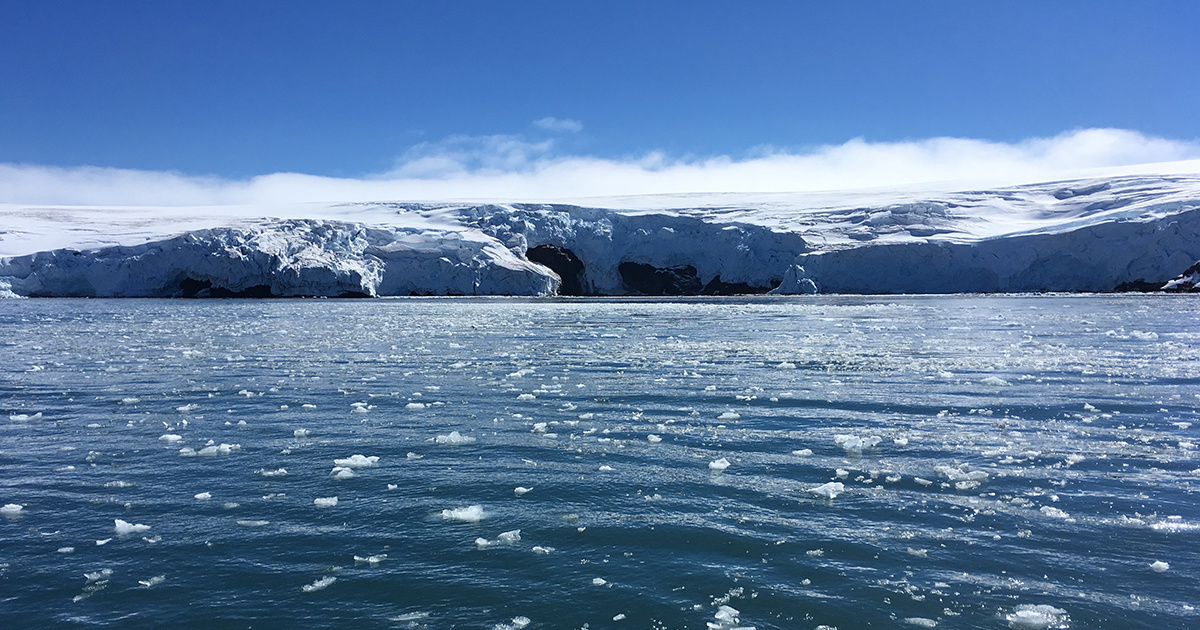

Sea ice off the coast of Antarctica's Collins glacier on King George Island. MATHILDE BELLENGER / AFP / Getty Images
A swath of Antarctica‘s sea ice larger than four times the size of France has melted since 2014, AFP reported Tuesday.
The rapid decline, revealed in a study of satellite data published by the Proceedings of the National Academy of Sciences, marks a stunning reversal for the South Pole: Between 1979 and 2014, its sea ice was actually expanding. Then, it lost 2.1 million square kilometers (approximately 810,815 square miles) in three years, falling from 12.8 million square kilometers (approximately 4.9 million square miles) to 10.7 million square kilometers (approximately 4.1 million square miles).
“It went from its 40-year high in 2014, all the way down in 2017 to its 40-year low,” study author and NASA Goddard Space Flight Center climatologist Claire Parkinson told AFP.
That also means that Antarctica rapidly caught up with the fast-melting Arctic. In four years, it lost as much sea ice as the Arctic lost in 34, The Guardian reported.
Scientists are still uncertain if the melting trend will continue or reverse again, and whether the climate crisis is to blame.
Parkinson told New Scientist that there was a similar rapid melt period in the 1970s followed by an expansion of ice, and the ice did begin to increase again between 2017 and 2018 before dipping to a new low record low for this time of year.
Sea ice in the Antarctic responds to more than just global temperature, as British Antarctic Survey sea ice expert Kaitlin Naughten told The Guardian.
“Westerly winds which surround the continent mean that Antarctic sea ice doesn’t respond directly to global warming averaged over the whole planet,” Naughten explained. “Climate change is affecting the winds, but so is the ozone hole and short-term cycles like El Niño. The sea ice is also affected by meltwater running off from the Antarctic ice sheet. Until 2014, the total effect of all these factors was for Antarctic sea ice to expand. But in 2014, something flipped, and the sea ice has since declined dramatically. Now scientists are trying to figure out exactly why this happened.”
But even if the melting isn’t caused by climate change, it could make it worse. That’s because the bright white of sea ice reflects 50 to 70 percent of sunlight back into space, Parkinson told CNN. Dark ocean water, on the other hand, absorbs 90 percent of that light.
“The rapid decline has caught us by surprise and changes the picture completely. Now sea ice is retreating in both hemispheres and that presents a challenge because it could mean further warming.” Leeds University professor Andrew Shepherd told The Guardian.
Sea ice loss does not contribute directly to sea level rise, but it does displace the wildlife that depends on the ice.
“Sea ice also affects the polar ecosystem, including penguins and whales and seals, petrels and albatrosses, krill, and a whole range of additional animals and marine plant life,” Parkinson told CNN.
- Antarctica's Ice Is Melting 5 Times Faster Than in the 90s - EcoWatch
- South Pole Warming More Than 3X Faster Than Rest of Planet, Study Finds - EcoWatch

 233k
233k  41k
41k  Subscribe
Subscribe 